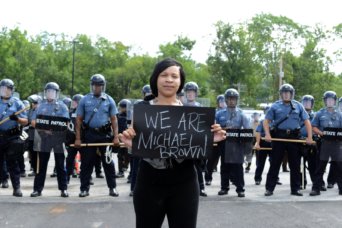- About
- Topics
- Picks
- Audio
- Story
- In-Depth
- Opinion
- News
- Donate
- Signup for our newsletterOur Editors' Best Picks.Send
Read, Debate: Engage.
| topic: | Racism |
|---|---|
| located: | USA |
| editor: | Murat Suner |
Reflecting Ferguson's Grand Jury Decision The American Civil Liberties Union (ACLU) points out that police departments act like occupying forces, imposing their will to control communities. The prevailing paradigm antagonizes communities and puts suspicion over entire neighbourhoods, enforcing a society of "us" and "them". In other words, there is a fundamental situation of distrust. This cannot be solved without structural changes.
To build trust, ACLU suggests "a democratic system of policing where our communities have an equal say in the way their neighbourhoods are policed. Collaboration, transparency, and communication between police and communities around the shared goals of equality, fairness..."
However, structural change is hard to be achieved if racism is only perceived as an issue of people of colour, and not as a phenomenon that affects the entire society.
S. Mitra Kalita, editor at Quartz, describes and analyzes why white people more so passively observe but rarely speak up when racial incidents and issues occur: "A lot of white people aren’t speaking out publicly against the killing of Michael Brown because they don’t see a space for themselves to engage meaningfully in the conversation so that they can move to action against racism."
The case of Ferguson (like many others in 400 years of racial discrimination) is a matter of civil rights, equality and democracy - surely just not a problem of black communities. On Quartz S. Mitra Kalita is pointing out 12 things particularly white people should do to encourage structural changes. Structural changes that could influence other aspects of society, such as reducing the number of homeless children in America.
